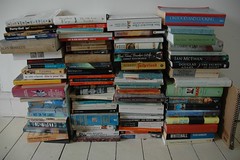Print Books: Purge or Hoard?
Although I love my print books, e-readers, in one form or another, have become my primary reading device over the last few years. I barely touch my print books, although they are still beautiful and important to me. But they sit on my bookshelf as a decorative and intellectual art form… When I voiced my reluctance to ship my books, one of my editors, horror-stricken, said: “You have to take your books with you! I mean, they are books. They are so important!” The book lover in me didn’t disagree, but the practical side of me did… In the end, I decided to leave 80 percent of the books behind, donating them to bookstores and even throwing some old, tattered volumes in the garbage. Readers, what would you have done? (NYTimes.com)
Old news. Familiar question. Sort of…
I just returned from the Writer’s Digest Conference where the question of jettisoning or clinging to print collections came up several times. No consensus, but an interesting question.
This winter/spring is “out with the old, in with the new” time for me, so I’m lightening my load in as many ways as I can. My 2012 word-of-the-year? Agile. I’ll revisit this in the months ahead. Am I throwing too much too fast for you to follow my line of reasoning? Yes, I am. Concept still jelling. Actually the concept and the conviction have jelled, but I’m still sorting through how to explain my mission. Dump nonessential baggage and travel light. Simplify. Cut the crap. Chase the dream… As you can see, I’m still in beta on this!
Nick Bilton‘s July 27 post, “Print Books: Should They Stay or Should They Go?” cuts right to the chase, and I suspect that his decision to pare print down to 20% of his collection will be an increasingly common phenomenon.
I’m not there. I like digital, but I’m a sucker for ink and paper and bindings. I’m passionate about marginalia-filled white space and flattened relics which tumble out of books instantly transporting us back to an orange poppy in Big Sur or a teenage romance. I’m not ready to swap my bookshelves and floor/windowsill/desk stacks for a slim digital facsimile. Not yet. Purge I will, but not the books. Not now.
What about you? Do you feel the urge to purge?
Related articles
- Purging My Books (jackieregales.com)
- This Incessant Need To Keep Books (inkwellsplatters.wordpress.com)
- What Will Happen To Print Books ? (nfaa.wordpress.com)
- Oh to read marginalia in your own book (totallylostforwords.wordpress.com)








